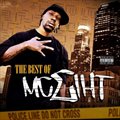by Jason Birchmeier
Veteran West Coast gangsta rapper MC Eiht dedicated much of his life to rap, beginning his seminal career with Comptons Most Wanted (CMW) while only a teenager. Despite his youth, Eihts contributions helped catapult CMW to national fame in 1990 with Its a Compton Thang. The group followed the lead of fellow Compton gangsta rappers N.W.A, but were a bit less controversial and, in turn, much less popular. CMW released two more albums — Straight Checkn Em (1991) and Music to Driveby (1992) — before Eiht began his solo career in 1993 with the groups producer, DJ Slip, in tow and Steiht Up Menace as his solo debut single. His debut solo album, We Come Strapped, topped Billboards R&B album chart a year later. Eihts sales numbers unfortunately went downhill from there, though he retained a cult audience over the years and remained loyal to longtime affiliates Slip and Mack 10.
Born Aaron Tyler in Los Angeles, Eiht began his career as part of CMW while still a teenager. After the song Rhymes Too Funky became a local hit, the group signed to Orpheus, who released three albums by the group: Its a Compton Thang (1990), Straight Checkn Em (1991), and Music to Driveby (1992). These albums offered several singles for the group, but none measured up to Eihts solo debut, Streiht Up Menace, in 1993. The Slip-produced ballad came from the Menace II Society soundtrack, a popular film Eiht had acted in. Following the success of this single, Eiht signed to Sonys Epic Street division and entered the studio with Slip to record his full-length solo debut, We Come Strapped. Billed as MC Eiht Featuring CMW, the album didnt really feature anyone from CMW except the rapper and producer. Nonetheless, the album debuted atop Billboards R&B album chart despite lacking an omnipresent lead single and reached the Top Five of the pop album chart. The album also garnered headlines for featuring not one, but two parental advisory stickers (Sony claimed no responsibility for the lyrical content).
None of Eihts successive albums were as successful as We Come Strapped, though some were arguably better. Following his initial success in 1994, the rapper returned in 1996 with Death Threatz and 1997 with Last Man Standing. Both albums featured production by Slip and were arguably better albums than Eihts chart-topping debut, yet Epic remained unimpressed and parted ways with the Compton gangsta rapper. It didnt take long for Eiht to return, though. He signed to Mack 10s Priority-distributed Hoo Bangin label and recorded Section 8 (1999), his most diverse album to date, if not his best. In successive years, Eiht recorded albums on an annual basis: N My Neighborhood (2000), Tha8tz Gangsta (2001), and Underground Hero (2002), all but Tha8tz Gangsta for Hoo Bangin. None of these albums topped the charts, but Eiht continued to move his career forward. For instance, he appeared alongside Ice Cube and Mack 10 in the 1999 film Thicker Than Water and even reunited with Comptons Most Wanted in 2000 for Represent.





